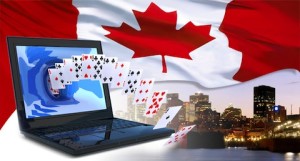In Canada, online gambling can be considered a “legal grey area.” It’s fully 100% legal because it’s not monitered and veted by the government. So it means that Canadians playing a few hands of internet poker or putting a few bets down on the big game, don’t have to worry that a SWAT team will crash down the door and seize their computer.
Canadian laws still needs time to catch up to issues caused by offshore gambling sites, file sharing, or Uber, and the complexities caused by a virtually connected world.
The provincial governments think that online gambling is worth the risk to invest in it. They are eager to place their bet on online gambling. That much is clear. The greyness originates from the internet, which doesn’t pay attention to provincial or national boundaries. Countless offshore gaming sites are based in distant places locales such as Gibraltar, the Isle of Man, and Cyprus, where gambling rules are wide open and governments welcome the tax revenue.
Michael Lipton, a gaming law expert and lawyer, with Dickinson Wright in Toronto, says the issue is best understood by looking at the legality of offshore sites accepting bets from Canada, as well as what the law says about bets made by Canadians. He says about the legality of gaming: “I don’t think [the law] is grey.”
He doesn’t think that anything in Canada’s Criminal Code makes wagering through an offshore site illegal for bettors and gamblers. “As far as I’m concerned, you as a player aren’t committing any criminal offence by being in a position where you are engaged with an offshore operator playing poker, playing slots, or whatever the case may be,” Lipton says. The tricky part is the legality of offshore operators taking bets from Canada and Canadians. Before the internet, the legal workings of gambling were clear. Each province determined its own rules for gambling, whether it’s casinos, bingos, lotteries or sports betting. The only exception is horse racing, it’s regulated by the Canadian Parimutuel Agency, a unit of the federal agriculture department.
In the meantime, every province except Saskatchewan has decided to embrace online gambling. B.C. began offering online sports betting in 2004 and poker in 2009, and online casino games and bingo in 2010. Manitoba and Quebec have a similar stance on online gambling, as does Ontario as of this January. Alberta will likely to join them later this year. On the East Coast, the Atlantic Lottery Corp. controls the sale of online lottery tickets and bingo for the Maritime provinces, but so far does not offer casino games such as roulette, poker, blackjack or slots online. Aside from a few inter-provincial agreements, outside bettors are restricted from playing on provincial sites.
The legality of offshore gaming sites accepting bets from Canadians and in Canadian dollars has yet to be tried in court, because gambling is a provincial responsibility, any legal uncertainty comes down to whether the Criminal Code prohibits offshore operators from doing business with Canadians.
A B.C. Supreme Court did set a precedent in 2001 that involved the case of Starnet Communications International. A company, that had a gambling licence from Antigua, but also kept offices in Vancouver. The court ruled that a Canadian-based gambling site couldn’t legally accept bets from Canadians.
The worrying part of the law which hasn’t yet been tested in Canadian court concerns offshore sites that don’t have a physical presence in Canada. Offshore sites are just a click away for gamblers, and what they are doing could be illegal.
According to Lipton, it is. “I don’t think [the law] is grey,” he says. “You may want to call it anything you call it, but I think I can point to a particular provision in the Criminal Code and I can tell an offshore operator, under the circumstances, that if you do such and such then you could be prosecuted under that particular section of the Criminal Code.”
So until offshore gambling is taken to court, the uncertainty will continue as to its legal status and to whether Canada will choose to enforce those laws.
In recent times, Canadian law enforcement is preoccupied with terrorism, drugs, and biker gangs. So it’s understandable to see why the RCMP, may have put online gambling on the back burner. And since more provinces are committing to online gaming, it will be seen if online gambling will become a legal issue at all. But since there’s a lot of Canadian currency flowing out to offshore sites, the argument seems to be strengthening for any legal grey areas on online gambling to become more black and white.


